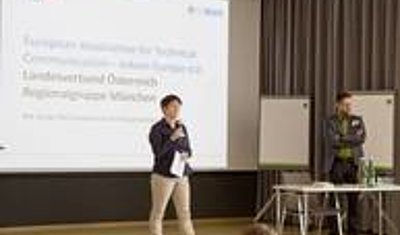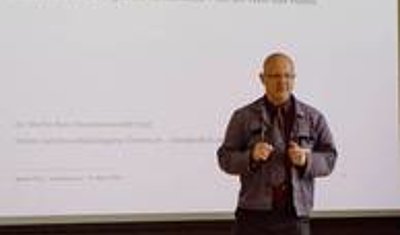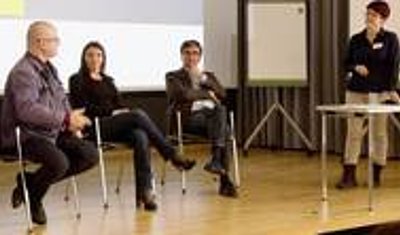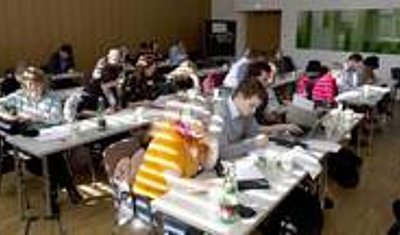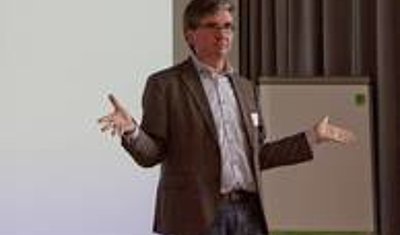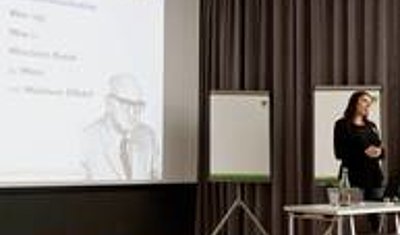15/05/18
Documenting comprehensibly – professionals’ skill!
Yvonne Gasser, Michael Valent, Zsuzsánna Gábor
More than 50 people gathered at the WIFI Tirol in Innsbruck (Austria) to learn about strategies that help creating comprehensible texts. Three experienced speakers – experts coming from different fields – provided new insights, answered questions and discussed interesting topics the whole day.
In the beginning, Yvonne Gasser (tekom Österreich) greeted the participants on behalf of tekom Österreich and the tekom Regional Group Munich; followed by a welcome from Elmar Veternik (WIFI Tirol). The Institute for Economic Promotion of the Austrian Economic Chambers (WIFI), that provides the Certification as a Technical Writer in whole Austria, was happy to host such an event.
I UNDERSTAND, THEREFORE I AM
The first speaker started the day with an approach very unfamiliar to Technical Writers: Dr. Martin Ross (University of Art and Design Linz) explained the task of conveying and imparting pieces of information from a philosophical point of view. In doing so, he spanned the period from Plato to a big home improvement store trying to describe with pictures only how to assemble a floor lamp – a fascinating travel through time and correlations motivating the audience to reflect about the concept of understanding. Incidentally, he illustrated with a practical example how Cicero can help even 2,000 years after his death in writing perfect instructions.
”What a highlight, I have never heard a presentation like this!“ says one of the enthusiastic participants.
TECHNICAL WRITING IS NO MAGIC
Taking up the previous topic, Mag. Claudia Hagendorfer (text-it Produktdokumentation) firstly presented an overview of the current status of comprehensibility research. Then, she explained why and how a clean documentation process can benefit comprehensibility. Giving rules and practical examples, she recommended considering five stylistic criteria:
- Concrete writing
- Active writing
- Omitting expletives, replacing empty phrases
- Using only few adjectives
Finally, she indicated how comprehensibility can positively affect translatability as well.
EDITORIAL GUIDE: A DIDACTICALLY DESIGNED SET OF RULES FOR THE GUIDANCE OF THE PRACTICAL WORK
The afternoon program began with Dr. Markus Nickl (doctima GmbH) leading a workshop about how to create editorial guides. Besides listing the specific content that needs to be in editorial guides, the speaker also elaborated on issues that are often not taken into account but that severely increase the acceptability of editorial guides: depending on the target group of the editorial guide, it makes sense to capture both the rules as well as the argumentation for their existence. This helps to understand the sense of the given rule. He warned of setting up too many rules and instead encouraged the participants to consider the needs of the given department and to set up only those rules that are indeed needed and that cannot be covered by software.
PANEL DISCUSSION
The day ended with a panel discussion where participants and speakers reflected on two important issues: the main characteristics of comprehensible texts and the role of Technical Writers in a company. Once again, it became clear: Not only must Technical Writers pay attention to their information products to be comprehensible, they also need to increasingly deal with comprehensibly and concisely presenting their work to other departments.
ACKNOWLEDGMENT
A big thank you to all the sponsors who have – along with our members – made this event possible:
- WIFI Tirol
- Noxum GmbH
- Congree Language Technologies GmbH

